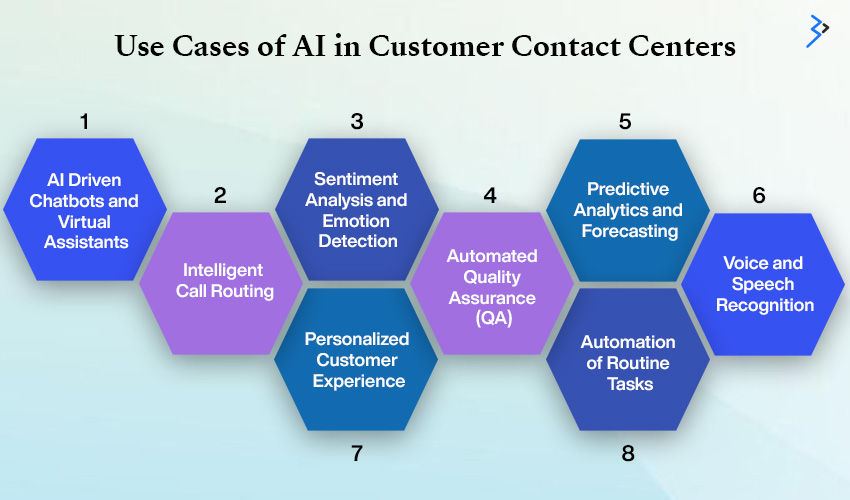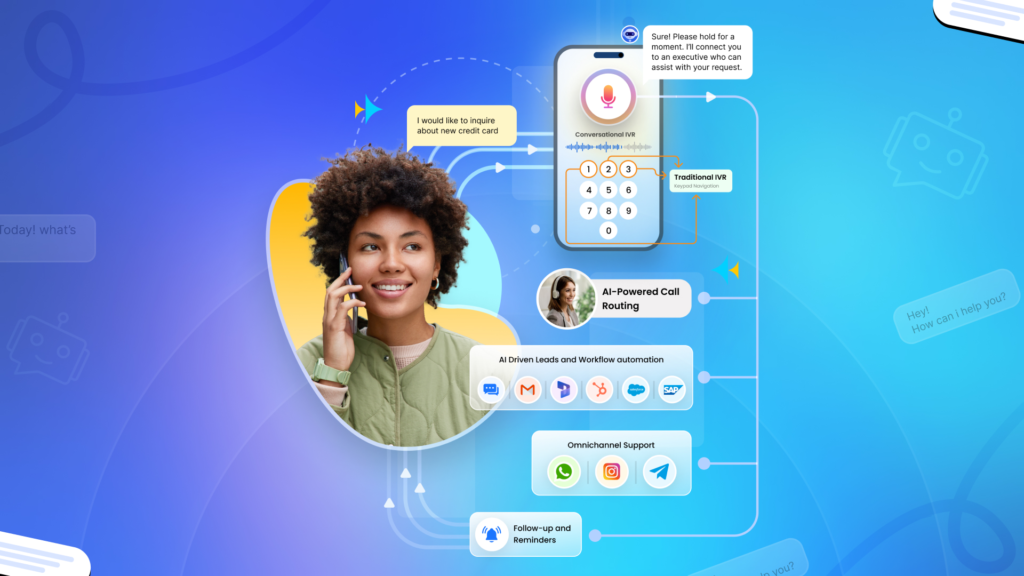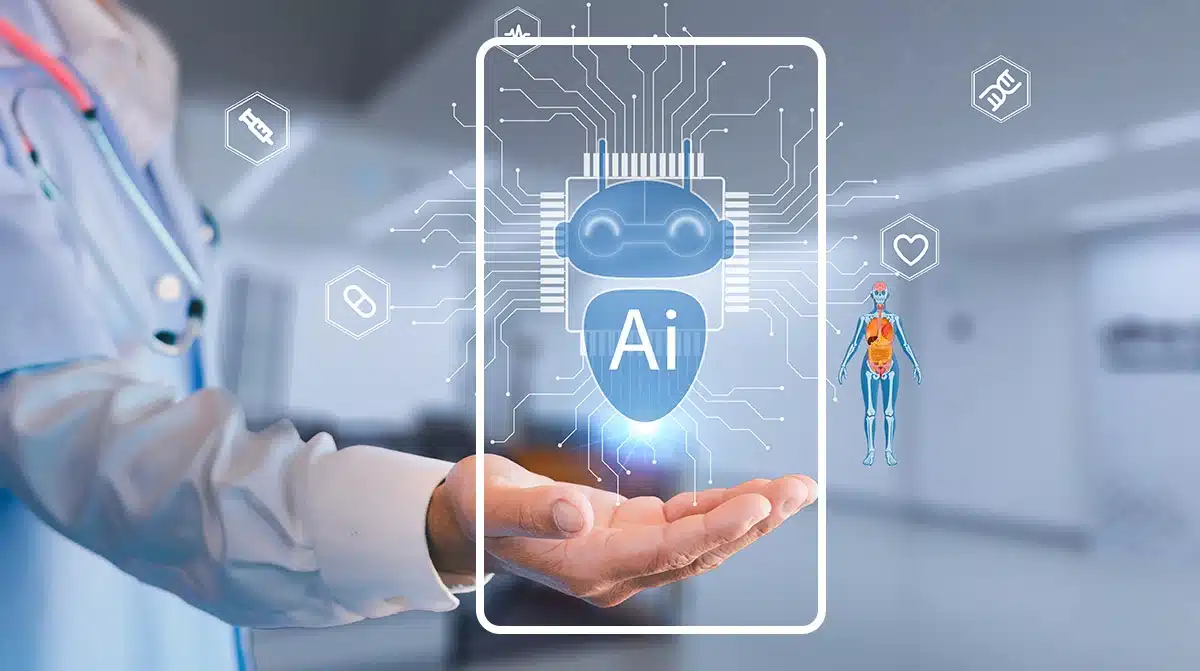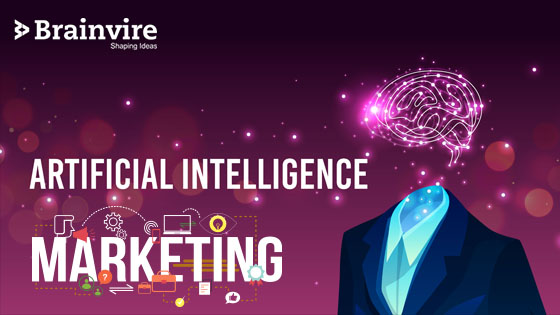In today’s fast-paced digital world, businesses increasingly use artificial intelligence (AI) to revolutionize customer contact centers. AI applications are reshaping the customer service landscape, enhancing operational efficiency and the customer experience. As organizations strive to meet their customers’ ever-evolving demands, AI offers innovative solutions that streamline operations, reduce costs, and provide superior service.
Call centers increasingly use artificial intelligence to transform their operations and consumer relations. This shift is distinguished by a series of AI-driven options, with each contact center solution aimed to improve customer service assistance’s efficiency and efficacy. Discover some important AI-powered innovations that will reshape contact centers in 2024.
This blog delves into various AI use cases in customer contact centers, showcasing how these technologies transform the industry and set new standards for customer support excellence.

What is an AI-Based Customer Contact Support Center?
An AI-based customer contact support center leverages advanced artificial intelligence technologies to enhance customer interactions. Unlike traditional contact centers that rely heavily on human agents, AI-based centers integrate sophisticated tools like chatbots, virtual assistants, and predictive analytics to handle customer inquiries efficiently.
Incorporating Artificial Intelligence (AI) in contact centers is transforming customer service. This blog article discusses how AI, namely Generative AI (GenAI) and Large Language Models (LLMs), is transforming call center operations for both customers and workers.
These AI-driven solutions enable contact centers to deliver faster, more accurate, and personalized support while optimizing operational processes.
Benefits of Using an AI-Based Customer Contact Support Center
The integration of AI in customer contact centers brings a myriad of benefits, including:
- Cost Reduction: AI agents automates repetitive tasks and processes, reducing the need for extensive human intervention and associated costs.
- Improved Response Time: AI technologies, such as chatbots and intelligent call routing, facilitate quicker responses to customer inquiries.
- Scalability: AI systems can handle many interactions simultaneously, making it easier for businesses to scale their operations without compromising service quality.
- Enhanced Customer Experience: Personalized and efficient support enhances customer satisfaction and loyalty.

Use Cases of AI in Customer Contact Centers
1. Chatbots and Virtual Assistants
AI-powered chatbots and virtual assistants are transforming how businesses interact with customers. These tools leverage natural language processing (NLP) to understand and respond to customer queries, offering a more efficient alternative to traditional customer support methods.
These solutions are part of a broader category known as conversational AI, which encompasses technologies that enable natural, human-like interactions between machines and customers across multiple channels.
Use Cases:
- 24/7 Customer Support: Chatbots provide round-the-clock support, ensuring customers can get help anytime.
- Handling Frequently Asked Questions (FAQs): AI chatbots can instantly address common questions, freeing human agents to focus on more complex issues.
- Multi-Language Support and Global Reach: Chatbots with NLP capabilities can interact with customers in multiple languages, making them ideal for businesses with a global presence.
Benefits:
- Cost Reduction: Automating routine inquiries reduces the need for a large team of customer service agents.
- Improved Response Time: Immediate, accurate responses enhance the customer experience and reduce wait times.
- Scalability and Consistent Service: Chatbots can manage high volumes of interactions simultaneously, maintaining consistent service quality.
2. Intelligent Call Routing
AI enhances call routing efficiency by using advanced algorithms to direct calls to the most appropriate agents based on various factors.
Use Cases:
- Matching Customers with the Best Available Agent: AI evaluates customer needs and routes them to agents with relevant expertise.
- Prioritizing High-Value Customers: Important customers or high-value accounts are prioritized, ensuring they receive prompt and specialized attention. Using an AI dialer to automatically initiate and distribute outbound calls, reducing agent idle time and improving productivity.
- Routing Based on Customer History and Preferences: AI uses historical data to route calls based on customer preferences and past interactions.
Benefits:
- Reduced Call Transfer Rates: Direct routing minimizes the need for customers to be transferred between multiple agents.
- Improved Customer Satisfaction: Personalized and efficient call handling service enhances customer experience.
- Enhanced Agent Productivity: Agents are more effectively utilized based on their skills and expertise, improving overall efficiency.
3. Sentiment Analysis and Emotion Detection
Sentiment analysis and emotion detection technologies analyze customer interactions to gauge emotions and sentiments, enabling more empathetic and effective responses.
Use Cases:
- Real-Time Customer Feedback Analysis: AI analyzes customer feedback in real-time to identify issues and areas for improvement.
- Identifying Customer Emotions During Interactions: AI tools detect customer emotions during conversations, such as frustration or satisfaction.
- Tailoring Responses to Customer Emotions: Responses are customized based on the detected emotions, leading to more personalized interactions.
Benefits:
- Enhanced Customer Engagement: Understanding customer emotions allows for more meaningful and engaging interactions.
- Proactive Issue Resolution: Early detection of negative sentiments enables swift action to resolve issues before they escalate.
- Better Customer-Agent Interaction Quality: Emotion-aware responses improve the quality of interactions, fostering better relationships with customers.
4. Automated Quality Assurance (QA)
Automated quality assurance processes utilize AI to monitor and evaluate customer interactions, ensuring compliance and identifying areas for improvement in contact center quality monitoring solutions.
Use Cases:
- Analyzing Call Recordings for Compliance and Quality: AI evaluates call recordings to ensure interactions meet company standards and regulatory requirements.
- Identifying Training Needs and Performance Issues: AI identifies areas where agents may need additional training or support.
- Automating Scorecards and Feedback: Automated systems generate performance scorecards and feedback, streamlining the evaluation process.
Benefits:
- Consistent and Unbiased Evaluations: AI provides objective assessments, reducing potential biases in quality evaluations.
- Time-Saving for Supervisors: Automated processes allow supervisors to focus on other critical tasks.
- Continuous Improvement in Service Quality: Ongoing analysis helps identify trends and areas for improvement, driving continuous enhancement in service quality.
5. Predictive Analytics and Forecasting
Predictive analytics and forecasting use AI to analyze data and predict future customer needs and behaviors.
Use Cases:
- Anticipating Call Volumes and Staffing Needs: AI predicts call volumes, helping contact centers allocate resources effectively.
- Predicting Customer Churn and Loyalty: AI analyzes customer behavior to forecast potential churn and develop retention strategies.
- Forecasting Sales Opportunities and Upselling Potential: AI identifies opportunities for upselling and cross-selling based on customer data and interactions.
Benefits:
- Optimized Resource Allocation: Accurate predictions enable better planning and resource management.
- Enhanced Customer Retention Strategies: Forecasting helps develop targeted retention strategies, improving customer loyalty.
- Informed Decision-Making: Data-driven insights support strategic decision-making and business planning.
6. Voice and Speech Recognition
Voice and speech recognition technologies facilitate more natural and efficient interactions between customers and contact centers.
Use Cases:
- Voice Biometrics for Customer Authentication: Voice recognition technology enhances security by verifying customer identities through unique voice patterns.
- Analyzing Speech Patterns for Compliance and Emotion: AI analyzes speech patterns to ensure compliance and detect emotional cues during interactions.
- Voice Bots for Hands-Free Customer Service: Voice bots allow customers to interact with the contact center hands-free.
Benefits:
- Enhanced Security: Voice biometrics improve security by providing a reliable method for customer authentication.
- Improved Customer Experience: Natural voice interactions offer a more intuitive and engaging customer experience.
- Efficient Data Collection and Analysis: Voice recognition technology facilitates accurate data collection and analysis.
7. Personalized Customer Experience
AI enables a highly personalized customer experience by leveraging data to tailor interactions and recommendations.
Beyond transactional data, many companies enhance their AI personalization by collecting detailed customer preferences through surveys, which is why they often look for Typeform alternatives like YouForm that can handle complex data collection needs.
Use Cases:
- Tailoring Product Recommendations: AI analyzes customer preferences and behaviors to suggest relevant products and services.
- Customizing Communication Based on Customer History: Communication strategies are personalized based on a customer’s interaction history.
- Personalizing Marketing and Service Offers: AI-driven insights inform targeted marketing and service offers that resonate with individual customers.
Benefits:
- Increased Customer Satisfaction: Personalized experiences enhance customer satisfaction and engagement.
- Higher Conversion Rates: Tailored recommendations and offers lead to higher conversion rates and increased sales.
- Stronger Customer Loyalty: Personalized interactions foster deeper connections and loyalty among customers.
8. Automation of Routine Tasks
AI automation streamlines repetitive and routine tasks, allowing agents to focus on more complex and value-added activities.
Use Cases:
- Automating Data Entry and Customer Information Updates: AI automates the entry and updating of customer information, reducing manual errors and administrative burdens.
- Processing Refunds and Returns: Routine processes like refunds and returns are automated, improving efficiency and accuracy.
- Scheduling Callbacks and Follow-Ups: AI handles scheduling tasks, ensuring timely follow-ups and callbacks.
Benefits:
- Reduced Operational Costs: Automation reduces the need for manual intervention, lowering operational costs.
- Freed-up Agent Time for Complex Issues: Agents can focus on more complex and high-value tasks, improving overall service quality.
- Increased Efficiency and Accuracy: Automated processes enhance accuracy and efficiency, minimizing errors and delays.
Case Study: Successful Implementation of AI in a Contact Center
To demonstrate the influence of AI on customer contact centers, consider a real-world example of successful AI deployment. These case studies demonstrate some of the primary advantages of artificial intelligence in a call center setting. These examples include prominent healthcare, financial services, and consumer players.
MoneySolver
MoneySolver is a financial services firm that offers customized student loan, tax, business, and credit solutions. Before using an AI-powered platform, MoneySolver recorded just a tiny number of calls to its contact center, which has over 100 workers that address consumer inquiries.
The technology now delivers automatic QA based on 100% of calls and real-time agent feedback, doubling the contact center’s closure rate. MoneySolver’s marketing team has also benefited from Google Ads integration, which has improved ad optimization and increased return on ad spend (ROAS) by 30%.
Windstream Holdings
Based in Little Rock, Ark., Windstream Holdings established a sales target of 40,000 new users for its premium internet and communication services in a pandemic-affected economy. However, management recognized that sales and marketing must first be integrated to attain that aim.
Using an AI-powered technology with automated call recording and conversation intelligence, leadership improved marketing performance by precisely matching ad campaigns to actual phone transactions, which accounted for 60% of their revenue. Before deployment, linking advertisements or campaigns to phone sales was guesswork. Windstream lowered CPA by 17%, reaching 150% of its subscription goal in 10 months using an AI-powered center.
CHRISTUS Health Plan
CHRISTUS Health Plan, an international faith-based non-profit in Irving, Texas, used the platform to automate QA in its contact center and better educate its agents. Support professionals now spend 50% less time scoring phone calls and ensure that agents use the appropriate welcome and other script instructions.
Using the AI-powered platform to record and transcribe every call sent to the contact center also gives CHRISTUS Health Plan’s call center leadership excellent, real-life teaching moments that they can utilize to train agents and drive continual improvement in the customer experience.
To Sum Up
AI is revolutionizing customer contact centers by offering innovative solutions that enhance customer experience and operational efficiency. AI’s use cases are diverse and impactful, from chatbots and virtual assistants to predictive analytics and personalized customer experiences.
As technology continues to evolve, the potential for AI in contact centers will only grow, providing businesses with new opportunities to deliver exceptional service and drive success. Businesses are encouraged to explore AI solutions and leverage their transformative potential to stay ahead in the competitive customer service landscape.
Related Articles
-
How Conversational AI & NLP are Streamlining Patient Scheduling and Post-Care Follow-ups
As a healthcare leader, you’ve likely invested millions in digital transformation, yet a persistent gap remains: the ability to scale high-touch, consistent communication without bloating your administrative overhead. We often
-
Artificial Intelligence – Your Future Predictor Crystal Ball!
You don’t need to hire a tarotcard reader, you yourself can be one. Yes, you can have your own crystal ball which would show your business outcomes without any haze
-
Influence of Artificial Intelligence in the Changing the Face of Marketing
With continuous evolution in the technological world, people are eager to leverage each of them in all possible ways. And as a marketer, I am sure you also might have




